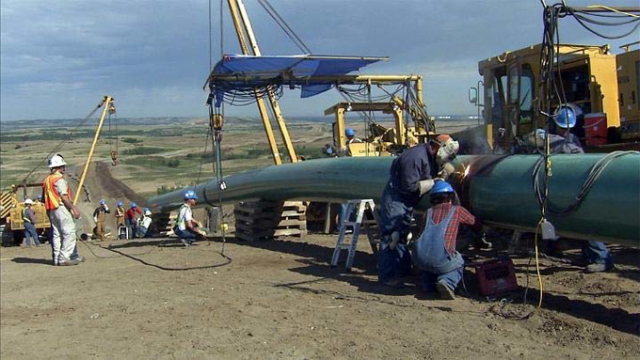Despite Political Obstruction Pipelines Have Caught Up With Rail In North Dakota

Shipping Bakken crude has become a hot-button political topic. Rail shipments are derided by fear mongering anti-oil activists as “bomb trains” but these same activists have also lined up to oppose pipeline infrastructure.
You almost get the idea that they’d rather the oil stay in the ground.
Still, there’s no question that pipelines are a generally safer method for transporting any sort of crude oil than rail, and so it’s significant that despite stiff political opposition pipeline infrastructure is catching up with Bakken oil production.
This chart created by the North Dakota Pipeline Authority shows trend lines for oil shipments by rail and pipeline (among other transport options). What’s interesting is that the amount of oil shipped by pipeline reached parity with oil shipments by rail in June:
One might be tempted to say that the oil price route is a reason for this shift, but really oil production hasn’t dropped off at all despite a sharp decline in the number of drillingrigs operating in the state. This chart is based on the most recent numbers from the North Dakota Department of Mineral Resources’ August report:
So why have pipelines caught up to rail for shipping Bakken crude?
“Justin Kringstad, director of the North Dakota Pipeline Authority, said in response to email questions the decline in rail volumes was in part because of the February start of the Double H pipeline, a project led by pipeline company Kinder Morgan,” reports UPI.
The Double H line is a 485 mile pipeline that runs from Dore, North Dakota, and can ship oil to refineries in Oklahoma. It has a capacity of up to 84,000 barrels per day and, as you can see, is already having a significant impact on how Bakken crude oil gets to market.
Now imagine what sort of impact the Keystone XL pipeline, which could take as much as 100,000 barrels per day of Bakken crude, or the Sandpiper line which could take up to 225,000 barrels per day, would have on oil by rail shipments.
The impact would be significant, which illustrates just how much damaging the political opposition to pipelines really is. Both the Keystone XL and Sandpiper lines have been held up by political delays, pushing more oil onto the unfairly labeled “bomb trains” which the activists claim they want to avoid.






